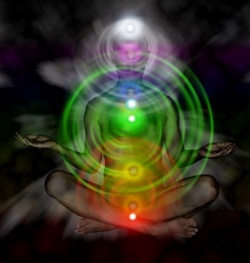Difference between revisions of "Three characteristics of existence"
| Line 1: | Line 1: | ||
[[File:Chakras-e1.jpg|thumb|250px|]] | [[File:Chakras-e1.jpg|thumb|250px|]] | ||
| − | [[three characteristics of existence]]; [[trilakṣaṇa]] [[tilakkhaṇa]] [[three characteristics of existence]]. [[Impermanence]] ([[anitya]]) | + | [[three characteristics of existence]]; [[trilakṣaṇa]] [[tilakkhaṇa]] [[three characteristics of existence]]. [[Impermanence]] ([[anitya]]) [[anicca]], [[Suffering]] ([[duḥkha]]) [[dukkha]] and [[non-self]] ([[anātma]]) [[[anattā]]] are [[The Three Characteristics of Existence]]. |
[[trilakṣaṇa]] ([[Sanskrit]]; [[Pāli]], [[tilakkhaṇa]]). The [[three characteristics]] or marks of all [[conditioned]] [[phenomena]]. They are [[impermanence]] ([[anitya]]), [[suffering]] ([[duḥkha]]), and absence of [[self]] ([[anātman]]). Although separate, they are also {{Wiki|interrelated}}: it is because things are [[impermanent]] that they involve [[suffering]], and it is a corollary of their [[impermanence]] that they have no enduring [[self]] or core. The implications of the three marks are set out in the first two of the [[Four Noble Truths]]. | [[trilakṣaṇa]] ([[Sanskrit]]; [[Pāli]], [[tilakkhaṇa]]). The [[three characteristics]] or marks of all [[conditioned]] [[phenomena]]. They are [[impermanence]] ([[anitya]]), [[suffering]] ([[duḥkha]]), and absence of [[self]] ([[anātman]]). Although separate, they are also {{Wiki|interrelated}}: it is because things are [[impermanent]] that they involve [[suffering]], and it is a corollary of their [[impermanence]] that they have no enduring [[self]] or core. The implications of the three marks are set out in the first two of the [[Four Noble Truths]]. | ||
| − | [[trilakṣaṇa]] ([[tilakkhaṇa]]) [[three characteristics | + | [[trilakṣaṇa]] ([[tilakkhaṇa]]) [[three characteristics of existence]]. [[Impermanence]] ([[anitya]]) ([[anicca]]), [[suffering]] ([[duḥkha]]) ([[dukkha]]) and [[non-self]] ([[anātma]]) ([[anattā]]) are the [[three characteristics of existence]]. |
{{R}} | {{R}} | ||
[http://dictionary.buddhistdoor.com/en/word/151360/three%20characteristics%20of%20existence dictionary.buddhistdoor.com] | [http://dictionary.buddhistdoor.com/en/word/151360/three%20characteristics%20of%20existence dictionary.buddhistdoor.com] | ||
[[Category:Buddhist Terms]] | [[Category:Buddhist Terms]] | ||
[[Category:Trilakṣaṇa]]{{BuddhismbyNumber}} | [[Category:Trilakṣaṇa]]{{BuddhismbyNumber}} | ||
Revision as of 07:01, 27 January 2015
three characteristics of existence; trilakṣaṇa tilakkhaṇa three characteristics of existence. Impermanence (anitya) anicca, Suffering (duḥkha) dukkha and non-self (anātma) [[[anattā]]] are The Three Characteristics of Existence.
trilakṣaṇa (Sanskrit; Pāli, tilakkhaṇa). The three characteristics or marks of all conditioned phenomena. They are impermanence (anitya), suffering (duḥkha), and absence of self (anātman). Although separate, they are also interrelated: it is because things are impermanent that they involve suffering, and it is a corollary of their impermanence that they have no enduring self or core. The implications of the three marks are set out in the first two of the Four Noble Truths.
trilakṣaṇa (tilakkhaṇa) three characteristics of existence. Impermanence (anitya) (anicca), suffering (duḥkha) (dukkha) and non-self (anātma) (anattā) are the three characteristics of existence.
